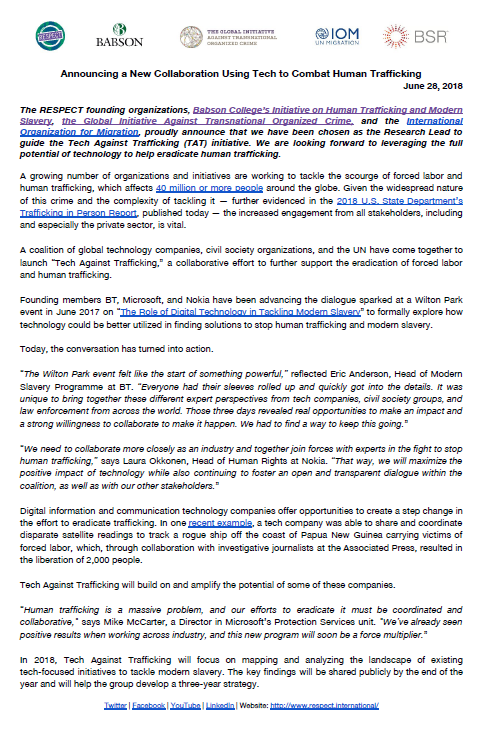When:
June 28, 2018 all-day
2018-06-28T00:00:00+02:00
2018-06-29T00:00:00+02:00
The RESPECT founding organizations, Babson College’s Initiative on Human Trafficking and Modern Slavery, the Global Initiative Against Transnational Organized Crime, and the International Organization for Migration, proudly announce that we have been chosen as the Research Lead to guide the Tech Against Trafficking (TAT) initiative. We are looking forward to leveraging the full potential of technology to help eradicate human trafficking.
A growing number of organizations and initiatives are working to tackle the scourge of forced labour and human trafficking, which affects 40 million or more people around the globe. Given the widespread nature of this crime and the complexity of tackling it — further evidenced in the 2018 U.S. State Department’s Trafficking in Person Report, published today — the increased engagement from all stakeholders, including and especially the private sector, is vital.
A coalition of global technology companies, civil society organizations, and the UN have come together to launch “Tech Against Trafficking,” a cooperative effort to further support the eradication of forced labour and human trafficking.
Founding members BT, Microsoft, and Nokia have been advancing the dialogue sparked at a Wilton Park event in June 2017 on “The Role of Digital Technology in Tackling Modern Slavery” to formally explore how technology could be better utilized in finding solutions to stop human trafficking and modern slavery.
Today, the conversation has turned into action.
“The Wilton Park event felt like the start of something powerful,” reflected Eric Anderson, Head of Modern Slavery Programme at BT. “Everyone had their sleeves rolled up and quickly got into the details. It was unique to bring together these different expert perspectives from tech companies, civil society groups, and law enforcement from across the world. Those three days revealed real opportunities to make an impact and a strong willingness to cooperate to make it happen. We had to find a way to keep this going.”
“We need to cooperate more closely as an industry and together join forces with experts in the fight to stop human trafficking,” says Laura Okkonen, Head of Human Rights at Nokia. “That way, we will maximize the positive impact of technology while also continuing to foster an open and transparent dialogue within the coalition, as well as with our other stakeholders.”
Digital information and communication technology companies offer opportunities to create a step change in the effort to eradicate trafficking. In one recent example, a tech company was able to share and coordinate disparate satellite readings to track a rogue ship off the coast of Papua New Guinea carrying victims of forced labour, which, through cooperation with investigative journalists at the Associated Press, resulted in the liberation of 2,000 people.
Tech Against Trafficking will build on and amplify the potential of some of these companies.
“Human trafficking is a massive problem, and our efforts to eradicate it must be coordinated and cooperative,” says Mike McCarter, a Director in Microsoft’s Protection Services unit. “We’ve already seen positive results when working across industry, and this new program will soon be a force multiplier.”
In 2018, Tech Against Trafficking will focus on mapping and analyzing the landscape of existing tech-focused initiatives to tackle modern slavery. The key findings will be shared publicly by the end of the year and will help the group develop a three-year strategy.
The potential focus areas coming out of the Wilton Park discussion include the following (to be further refined in the Tech Against Trafficking strategy development process):
- Cloud and mobile apps to allow first-line responders, the public, and vulnerable workers to raise awareness, access resources, and report concerns, among a wide variety of other solutions.
- Basic hardware, such as laptops and smartphones to be made more easily available by technology providers to NGOs supporting vulnerable groups and victims.
- National helplines that raise awareness, support victims, and serve as hubs of data collection, analysis, and sharing to advance our understanding of and response to slavery.
- Data tools to deal with the problem of data overload that can disable effective responses and to identify connections in the data that would otherwise be missed (e.g. using AI and Big Data).
- Supply chain transparency tools to improve traceability and transparency of supply chain labour standards.
Business for Social Responsibility (BSR) has been appointed secretariat of Tech Against Trafficking and will be supported by an Advisory Group of civil society organizations. The RESPECT Initiative, which is composed of Babson College’s Initiative on Human Trafficking and Modern Slavery, Global Initiative Against Transnational Organized Crime, and the International Organization for Migration, has been appointed as the research lead of Tech Against Trafficking.
“Business engagement is essential in the global fight against modern slavery, and it’s great to see these organizations leading the way in their commitment to the issue,” said Andrew Wallis, OBE, CEO of anti-slavery charity Unseen. “They bring a fantastic amount of technical expertise, in addition to huge clout. Technology offers transformational potential not just to disrupt and reduce modern slavery, but to support care and remedy mechanisms for survivors. We look forward to working together in partnership in the fight to end slavery for good.”
With leading technology companies combining their experience and expertise to focus on this issue, it’s an exciting time for the technology and human rights space. The more companies involved, the stronger this initiative and its impact will be.
We invite all interested technology companies to contact us at livia.wagner@globalinitiative.net (Ms. Livia Wagner) now to find out how to get involved.


